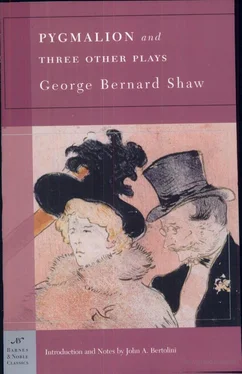Howbeit, the fact that my plays effected a lodgment on the London stage, and were presently followed by the plays of Granville Barker, Gilbert Murray, John Masefield, St. John Han kin, Laurence Housman, Arnold Bennett, John Galsworthy, John Drinkwater, and others which would in the nineteenth century have stood rather less chance of production at a London theatre than the Dialogues of Plato, not to mention revivals of the ancient Athenian drama and a restoration to the stage of Shakespeare’s plays as he wrote them, was made economically possible solely by a supply of theatres which could hold nearly twice as much money as it cost to rent and maintain them. In such theatres work appealing to a relatively small class of cultivated persons, and therefore attracting only from half to three-quarters as many spectators as the more popular pastimes, could nevertheless keep going in the hands of young adventurers who were doing it for its own sake, and had not yet been forced by advancing age and responsibilities to consider the commercial value of their time and energy too closely. The war struck this foundation away in the manner I have just described. The expenses of running the cheapest westend theatres rose to a sum which exceeded by twenty-five per cent the utmost that the higher drama can, as an ascertained matter of fact, be depended on to draw. Thus the higher drama, which has never really been a commercially sound speculation, now became an impossible one. Accordingly, attempts are being made to provide a refuge for it in suburban theatres in London and repertory theatres in the provinces. But at the moment when the army has at last disgorged the survivors of the gallant band of dramatic pioneers whom it swallowed, they find that the economic conditions which formerly made their work no worse than precarious now put it out of the question altogether, as far as the west end of London is concerned.
I do not suppose many people care particularly. We are not brought up to care; and a sense of the national importance of the theatre is not born in mankind: the natural man, like so many of the soldiers at the beginning of the war, does not know what a theatre is. But please note that all these soldiers who did not know what a theatre was, knew what a church was. And they had been taught to respect churches. Nobody had ever warned them against a church as a place where frivolous women paraded in their best clothes; where stories of improper females like Potiphar’s wife, and erotic poetry like the Song of Songs, were read aloud; where the sensuous and sentimental music of Schubert, Mendelssohn, Gounod, and Brahms was more popular than severe music by greater composers; where the prettiest sort of pretty pictures of pretty saints assailed the imagination and senses through stained-glass windows; and where sculpture and architecture came to the help of painting. Nobody ever reminded them that these things had sometimes produced such developments of erotic idolatry that men who were not only enthusiastic amateurs of literature, painting, and music, but famous practitioners of them, had actually exulted when mobs and even regular troops under express command had mutilated church statues, smashed church windows, wrecked church organs, and torn up the sheets from which the church music was read and sung. When they saw broken statues in churches, they were told that this was the work of wicked, godless rioters, instead of, as it was, the work partly of zealots bent on driving the world, the flesh, and the devil out of the temple, and partly of insurgent men who had become intolerably poor because the temple had become a den of thieves. But all the sins and perversions that were so carefully hidden from them in the history of the Church were laid on the shoulders of the Theatre: that stuffy, uncomfortable place of penance in which we suffer so much inconvenience on the slenderest chance of gaining a scrap of food for our starving souls. When the Germans bombed the Cathedral of Rheims the world rang with the horror of the sacrilege. When they bombed the Little Theatre in the Adelphi, and narrowly missed bombing two writers of plays [277] J. M. Barrie (see footnote to page 320) and Shaw, who were neighbors and friends.
who lived within a few yards of it, the fact was not even mentioned in the papers. In point of appeal to the senses no theatre ever built could touch the fane [278] Cathedral.
at Rheims: no actress could rival its Virgin in beauty, nor any operatic tenor look otherwise than a fool beside its David. Its picture glass was glorious even to those who had seen the glass of Chartres. It was wonderful in its very grotesques: who would look at the Blondin Donkey [279] Music-hall turn by the animal imitators the Brothers Griffiths that parodied the French tightrope walker Charles Blondin (1824 — 1897).
after seeing its leviathans? In spite of the Adam-Adelphian [280] The decor of the Adelphi Theatre was by Scottish architect Robert Adam (1728-1792).
decoration on which Miss Kingston had lavished so much taste and care, the Little Theatre was in comparison with Rheims the gloomiest of little conventicles: indeed the cathedral must, from the Puritan point of view, have debauched a million voluptuaries for every one whom the Little Theatre had sent home thoughtful to a chaste bed after Mr Chesterton’s Magic or Brieux’s Les Avaries. [281] Play by French dramatist Eugene Brieux, adapted into English in 1914 as Damaged Goods, by John Pollock.
Perhaps that is the real reason why the Church is lauded and the Theatre reviled. Whether or no, the fact remains that the lady [282] Reference to English theater manager A. E. F. Horniman (1860-1937), who presented Shaw’s first publicly produced play, Arms and the Man, in 1894.
to whose public spirit and sense of the national value of the theatre I owed the first regular public performance of a play of mine had to conceal her action as if it had been a crime, whereas if she had given the money to the Church she would have worn a halo for it. And I admit, as I have always done, that this state of things may have been a very sensible one. I have asked Londoners again and again why they pay half a guinea to go to a theatre when they can go to St. Paul’s or Westminster Abbey for nothing. Their only possible reply is that they want to see something new and possibly something wicked; but the theatres mostly disappoint both hopes. If ever a revolution makes me Dictator, I shall establish a heavy charge for admission to our churches. But everyone who pays at the church door shall receive a ticket entitling him or her to free admission to one performance at any theatre he or she prefers. Thus shall the sensuous charms of the church service be made to subsidize the sterner virtue of the drama.
The present situation will not last. Although the newspaper I read at breakfast this morning before writing these words contains a calculation that no less than twenty-three wars are at present being waged to confirm the peace, England is no longer in khaki; and a violent reaction is setting in against the crude theatrical fare of the four terrible years. Soon the rents of theatres will once more be fixed on the assumption that they cannot always be full, nor even on the average half full week in and week out. Prices will change. The higher drama will be at no greater disadvantage than it was before the war; and it may benefit, first, by the fact that many of us have been torn from the fools’ paradise in which the theatre formerly traded, and thrust upon the sternest realities and necessities until we have lost both faith in and patience with the theatrical pretences that had no root either in reality or necessity; second, by the startling change made by the war in the distribution of income. It seems only the other day that a millionaire was a man with £50,000 a year. To-day, when he has paid his income tax and super tax, and insured his life for the amount of his death duties, he is lucky if his net income is £10,000, though his nominal property remains the same. And this is the result of a Budget which is called “a respite for the rich .”At the other end of the scale millions of persons have had regular incomes for the first time in their lives; and their men have been regularly clothed, fed, lodged, and taught to make up their minds that certain things have to be done, also for the first time in their lives. Hundreds of thousands of women have been taken out of their domestic cages and tasted both discipline and independence. The thoughtless and snobbish middle classes have been pulled up short by the very unpleasant experience of being ruined to an unprecedented extent. We have all had a tremendous jolt; and although the widespread notion that the shock of the war would automatically make a new heaven and a new earth, and that the dog would never go back to his vomit nor the sow to her wallowing in the mire, [283] Allusion to the Bible, 2 Peter 2:22.
is already seen to be a delusion, yet we are far more conscious of our condition than we were, and far less disposed to submit to it. Revolution, lately only a sensational chapter in history or a demagogic claptrap, is now a possibility so imminent that hardly by trying to suppress it in other countries by arms and defamation, and calling the process anti-Bolshevism, can our Government stave it off at home.
Читать дальше












